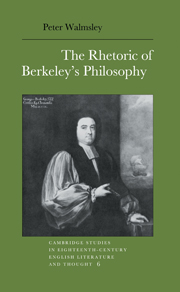10 - Conversations with ingenious men
Published online by Cambridge University Press: 21 August 2009
Summary
When he arrived in London for the first time in January 1713, Berkeley was immediately befriended by Steele, and he soon found himself regularly in the company of Addison, Pope, Arbuthnot and Swift. These friendships naturally revolved around the coffee-houses and it was in making the rounds of such establishments that Berkeley first encountered the modern free-thinker in person. The town was full of talk of Collins's recently published Discourse of Free Thinking, and Berkeley's first letter to Percival from London, dated 26 January, condemns it as ‘a very bold and pernicious book’ (VIII.58). But free-thinking was then as thriving in conversation as it was in print. In the Advertisement to Alciphron, Berkeley adamantly defends his claim that some free-thinkers are atheists and asserts: ‘This the author knows to be true, and is well assured that one of the most noted writers against Christianity in our times declared he had found out a demonstration against the being of a God’ (III.23). The grounds for this claim are explained in Samuel Johnson's autobiography. Berkeley once described to Johnson how he had sought out the deists in London, and had ‘been several times in their clubs in quality of a learner and so perfectly knew their manner … On one of these occasions … he heard Collens [sic] declare that he had found a demonstration against the being of a God’.
Certain circumstances cast doubt on the accuracy of this anecdote, not least the fact that it would have been difficult for Berkeley to have met Collins during his first stay in London.
- Type
- Chapter
- Information
- The Rhetoric of Berkeley's Philosophy , pp. 123 - 138Publisher: Cambridge University PressPrint publication year: 1990

